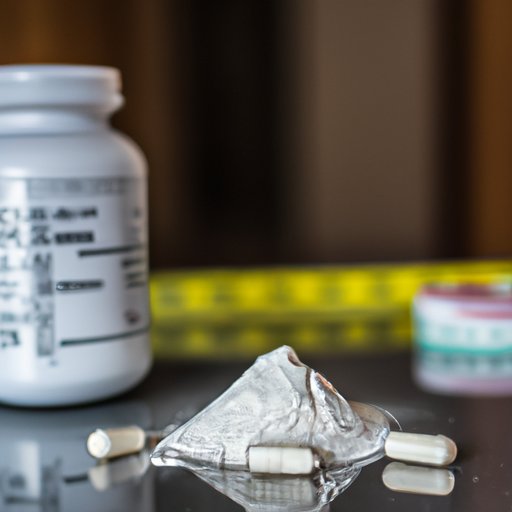
Introduction
Creatine is a natural compound that helps the body produce energy and is primarily found in muscle tissue. For some people, gaining weight, particularly muscle mass, can be a challenging task. In this article, we will examine the science behind creatine, how it can help with weight gain and muscle building, the recommended dosage, timing, and effectiveness, and the myths and facts about creatine and weight gain.
The Science Behind Creatine: How it Helps You Gain Weight and Build Muscle
Creatine plays a crucial role in muscle growth as it helps to produce energy during physical activity. It is a molecule that is responsible for providing energy to muscle cells, improving athletic performance, and facilitating muscle recovery. Creatine supplements work by increasing the amount of creatine stored in the muscles, allowing for more energy production and improved muscle growth. Some of the benefits of creatine for weight gain and muscle building include:
- Increased muscle mass and strength.
- Improved performance during high-intensity exercise.
- Enhanced recovery after exercise.
- Increased muscle endurance.
- Reduced fatigue and muscle damage.
Gaining Weight with Creatine: Dosage, Timing, and Effectiveness
While creatine can be found in food sources such as meat and fish, it is difficult to consume enough creatine through diet alone to see significant results. Therefore, creatine supplementation is a popular choice for individuals looking to gain weight and build muscle.
The recommended daily dosage of creatine is 3-5 grams per day, but this can vary depending on the individual’s body weight and exercise routine. It is important to follow the directions on the supplement and not exceed the recommended dosage.
The best time to take creatine is post-workout, or when the muscles are most receptive to absorbing the supplement. Creatine can be taken as a powder mixed with water or other beverages, or in pill form.
It can take up to 4 weeks to start seeing results from creatine supplementation, and consistency is key in achieving desired outcomes.
Effectiveness can be measured through regular body composition assessments such as measuring body fat percentage, muscle mass, and strength gains.
Maximizing Your Muscle Gain with Creatine Supplementation
While creatine can be effective on its own, combining it with a regular exercise routine can maximize its benefits. Strength training and high-intensity interval training have been shown to be particularly effective when combined with creatine supplements.
Combining creatine with other supplements such as protein powder or BCAAs (branched-chain amino acids) can also enhance muscle growth and recovery.
Diet also plays an important role in maximizing muscle gain with creatine. A diet high in protein and complex carbohydrates can provide the necessary nutrients for muscle growth, and sufficient hydration is crucial for creatine absorption in the muscles.
Breaking Down the Myths and Facts about Creatine and Weight Gain
There are several common misconceptions about creatine that may deter individuals from trying it. One of the most common myths is that creatine is a steroid, which is not true. Creatine is a natural compound found in the body and can be consumed through diet or supplementation.
Another myth is that creatine causes kidney damage or other health problems. While it is important to follow recommended dosage and not exceed safe levels, creatine is generally regarded as safe and is well-tolerated by most individuals.
A common misconception is that creatine causes water retention, leading to a bloated appearance. While it is true that creatine can cause water retention, this effect is usually minor and can contribute to improved muscle performance and recovery.
The Role of Creatine in Weight Gain and Athletic Performance
Weight gain and athletic performance are often intertwined, and creatine can play a significant role in both. Creatine supplements can help athletes improve their performance by providing increased energy during high-intensity exercise, enhanced endurance, and improved recovery after physical activity.
Creatine has been shown to be particularly effective in sports that require short bursts of energy such as sprinting, weightlifting, and football.
In addition to improving athletic performance, creatine can also aid in weight gain by facilitating muscle growth.
Real People, Real Results: Personal Accounts of Weight Gain with Creatine
Many individuals have experienced success in gaining weight and building muscle with creatine supplementation. Taking a look at personal accounts can provide insights into dosages, timing, and best practices.
Several factors have contributed to individuals’ success with creatine, including consistent supplementation, following a proper diet, and engaging in regular physical activity.
Some tips and tricks include starting with a lower dosage and gradually increasing it, taking creatine with food to reduce stomach discomfort, and staying consistent with supplementation and exercise routines.
Conclusion
In conclusion, creatine can be an effective supplement for individuals looking to gain weight and build muscle. It is important to follow recommended dosages, timing, and exercise routines to maximize its benefits. Creatine is generally regarded as safe and is well-tolerated by most individuals, despite common misconceptions. Real people have experienced success with creatine supplementation, and proper diet and consistency are key in achieving desired outcomes.




